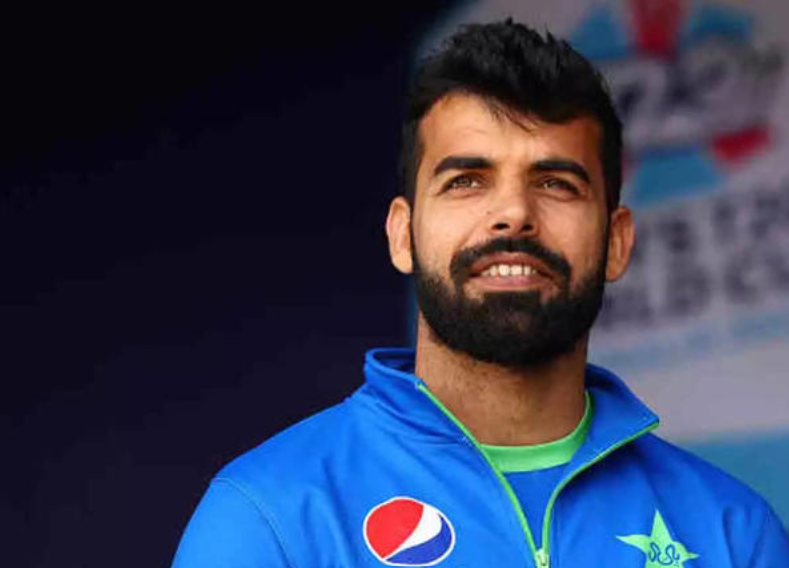
Shadab Khan response : Shadab Khan Responds to Actress Claims with “Aap Reply Na Karen”
In the ever-connected digital age, celebrities and public figures often find themselves in the middle of controversies that can blow up within hours. The latest controversy to make waves involves Pakistan cricketers and claims made by actresses about receiving unsolicited messages from cricketers. While many are divided on the matter, one voice that has stood out is that of Shadab Khan, a prominent figure in Pakistan’s cricketing world. Amid the growing buzz surrounding these allegations, Shadab Khan chose a calm, composed response, advising, “Aap reply na karen” (Don’t reply). This simple yet impactful statement has sparked conversations and raised important questions about the way public figures handle such situations.
The Claims and Growing Buzz
The controversy began when several actresses took to social media to claim that they had received inappropriate and unsolicited messages from certain Pakistan cricketers. These claims quickly garnered significant attention, with fans, critics, and media outlets weighing in on the matter. Some actresses shared their experiences online, creating a flurry of conversations around harassment and the conduct of public figures.
As the claims spread, many fans expressed their support for the actresses, condemning the alleged behavior of the cricketers. Others, however, were quick to question the veracity of the claims, pointing out that allegations of this nature can sometimes be exaggerated or unsubstantiated. Regardless of the truth behind the allegations, the issue became a hot topic for discussion in both entertainment and sports circles, with people wondering about the ethics of public figures in the digital age.
Shadab Khan’s Composed Response
Amidst the storm of speculation and media frenzy, Shadab Khan, known for his calm demeanor and professionalism both on and off the field, responded with a level of restraint that stood in stark contrast to the heated discussions unfolding online. His response, “Aap reply na karen,” or “Don’t reply,” was aimed at both the actresses involved and the public.
Shadab’s message appeared to be one of maintaining composure in the face of controversy. He advised that, rather than engaging with such messages or responding to the claims, the best course of action would be to simply ignore them and let the situation fade naturally. His stance was not just about avoiding drama but also about keeping a level of dignity in a situation that could otherwise escalate quickly.
This advice was especially noteworthy because it emphasized emotional maturity. In an age where public figures are often pushed into reacting hastily to allegations, Shadab’s suggestion to stay calm and avoid reacting emotionally was a breath of fresh air. His response was not about denying the allegations or excusing any wrong behavior, but about steering clear of unnecessary escalation in the media.
Public Reactions to Shadab Khan’s Statement
Shadab Khan’s response to the controversy was met with a variety of reactions from the public. Many supporters of the cricketer praised his mature approach. In a time where public figures often feel pressured to give immediate responses, Shadab’s suggestion to not engage with online negativity resonated with many fans who appreciated his level-headedness.
For those who had been following the controversy closely, Shadab’s response seemed like the right approach. In a world where social media reactions can quickly spiral into online mob behavior, his message emphasized the importance of not feeding into the narrative. Instead of further fueling the controversy, Shadab’s response allowed for a space of calm and reflection.
However, not all reactions were positive. Some critics believed that Shadab’s response, while calm, failed to directly address the severity of the allegations. They argued that merely telling the actresses and others involved to “not respond” may not be sufficient, especially if the claims involved harassment or other serious concerns. These critics felt that the issue required a more proactive approach, one that would call for accountability and transparency.
The Larger Implication: Social Media and Public Figures
Shadab Khan’s advice brings attention to the challenges that public figures, especially athletes and celebrities, face in an age dominated by social media. While these platforms allow for direct interaction with fans and followers, they also create an environment where personal boundaries are often blurred, and controversies can quickly escalate. For cricketers like Shadab, the pressure to respond to every online incident can be overwhelming, and the potential for their reputation to be damaged is high.
In this context, Shadab’s response can be seen as a reminder of the need to take a step back and think carefully before reacting to social media incidents. His stance suggests that reacting to negativity or getting involved in online drama can often do more harm than good. This is an important lesson not just for public figures, but also for everyday social media users, who may find themselves in similar situations.
By urging others to “not respond,” Shadab Khan was also reinforcing the idea that not every issue needs to be addressed publicly. There is value in choosing silence over engagement, especially when the situation at hand is speculative or lacking clear evidence.
Media’s Role in Shaping Public Perception
The role of the media in amplifying such stories is also crucial. In the digital era, stories like the one involving Pakistan cricketers and actresses can quickly snowball due to the 24/7 news cycle. Media outlets, both traditional and digital, often amplify such stories, sometimes focusing more on sensationalism than on the facts.
Shadab Khan’s response could also be seen as a subtle critique of the media’s role in the story. By not engaging directly with the allegations, he seems to be sending a message to the media as well—encouraging them to be more responsible in their coverage of such matters and to avoid turning unverified claims into a media circus. Public





